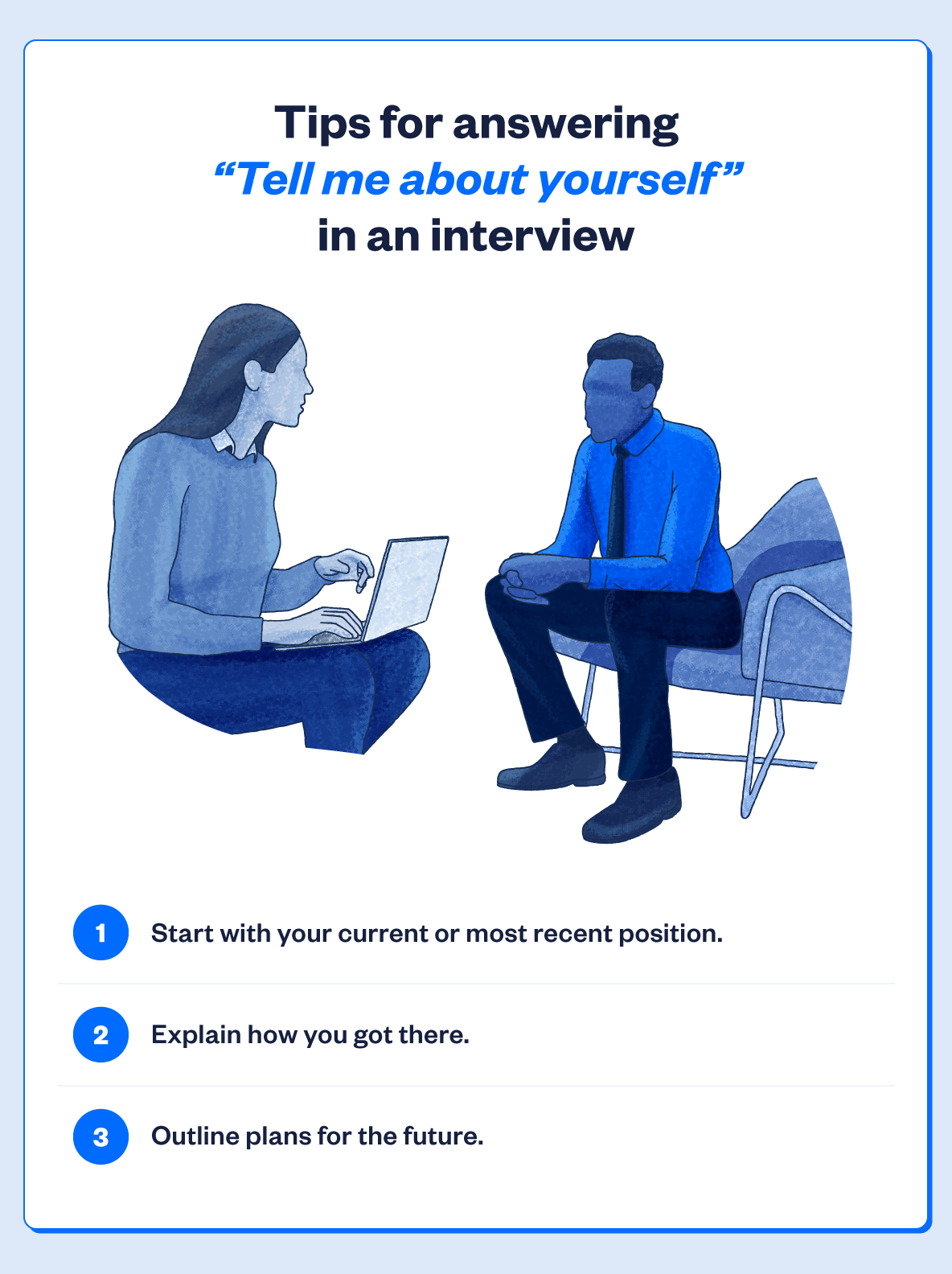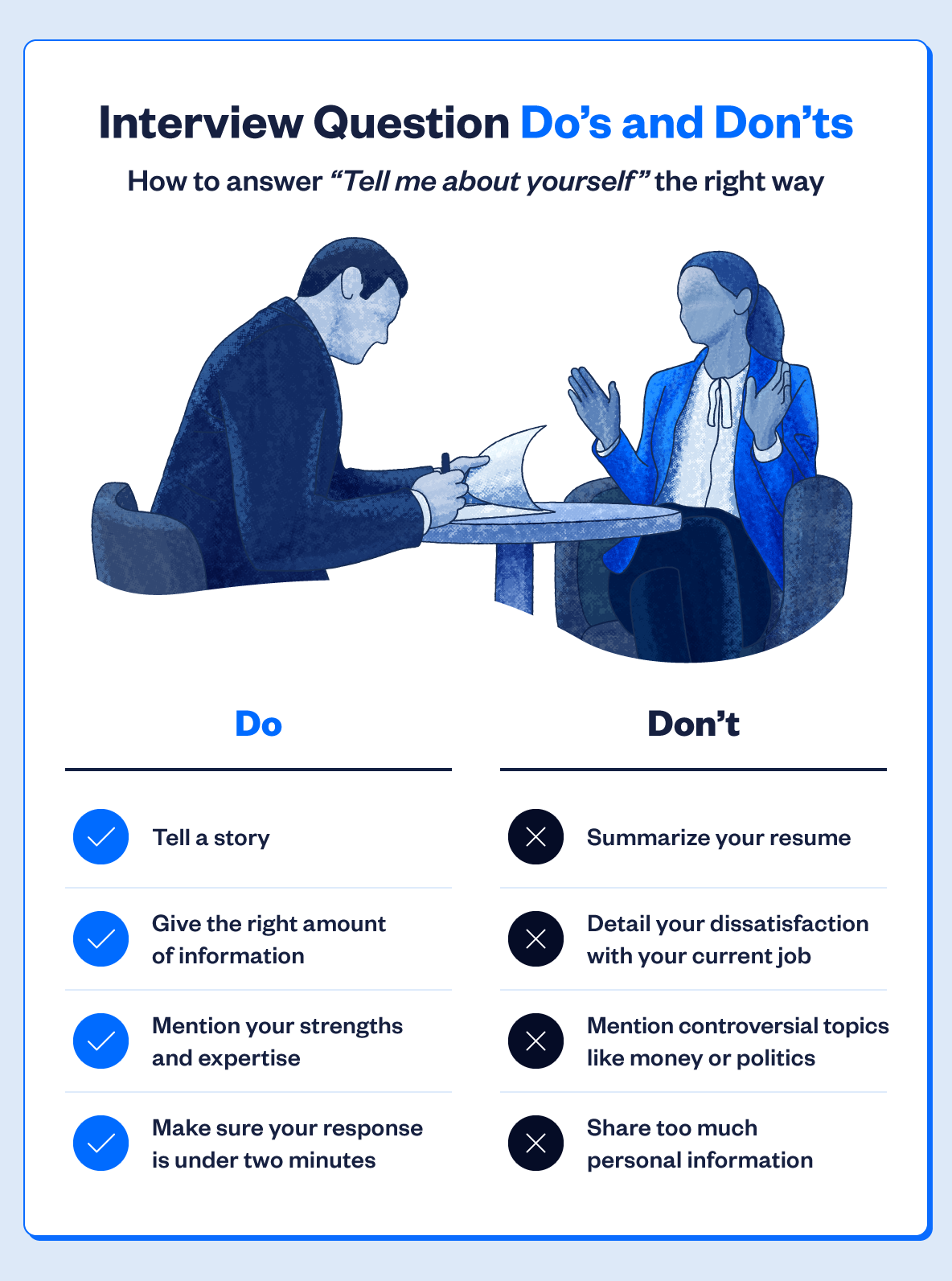Depending on your experience, it can be difficult to know where exactly to start when answering this age-old question — interviewers don’t want to know your life story, so tailoring your response to the context of the job description is the best way to answer this type of interview question.
To help, we sourced expert insight from founders and hiring managers from a variety of industries to learn what they look for in candidates’ interview answers. Keep reading to learn exactly how to answer the “Tell me about yourself” interview question with ease.
Why do employers ask you to describe yourself?
As the opening question to the interview, this query gives interviewers the ability to ease into the conversation by starting with a simple and open-ended inquiry, setting the tone for the rest of the interview.
It’s also known to stump many job seekers and ultimately shows which interviewees are good under pressure. “A common mistake among candidates is that upon hearing the question, they launch into talking about their life story,” says Sawinery founder Robert Johnson. “This is a red flag for the panel and can hurt your chances for the position.”
The goal of the question is for employers to see if you can pitch yourself, meaning that you should provide an elevator pitch of who you are, what you can do, and how you can be an asset to the company in the job you’re applying for.
How to answer “Tell me about yourself” in 3 simple steps

Before you begin crafting your answer to the above question, make sure to research the company ahead of time so you can tie your answers to the position. For example, if the company aims to make artificial intelligence accessible to everyone, you could frame your response to highlight your experience in that industry.
That being said, the three elements of a successful answer to this interview question include your present role, past jobs, and where you see yourself in the future.
1. Start with your current or most recent position
Explain your current or most recent position by detailing your title, responsibilities, and knowledge needed in the role. RoverPass CEO Ravi Parikh advises candidates to make sure their explanation is relevant, as “you want your interviewer to understand exactly why you’re discussing a past role.”
2. Explain how you got there
Make sure to share your career path including education and work experience that is relevant to the position you are interviewing for. BetWorthy Co-founder Scott Hasting advises candidates to “sift the information and highlight items that you think can help you land the job.”
3. Outline plans for the future
Employers like to see drive and proactive planning among employees, meaning they want to learn how working at their company would progress your career goals as well as what you can do for the company. For example, if you’re applying for a data scientist role, you may want to highlight your plan to go back to school for a postgraduate degree in the field.
The Dos and Don’ts

It can be difficult to determine what you should or shouldn’t include in your answer. Matt Brown, the CEO at Bonsai, suggests that candidates should “highlight impressive accomplishments and experiences.”
Use this as an opportunity to provide interviewers with your personal elevator pitch. Below are some do’s and don’ts to keep in mind if you’re looking to stand out from the crowd.
- DO tell a story. Turn your resume into an impactful, memorable story that encompasses prior work-life experiences and how it led you to this role. Diane Cook, an HR specialist at Resume Seed, “loves when people share hidden talents in their introductory messages — this makes them stand out.”
- DON’T detail your dissatisfaction with your current job. Telling interviewers about your dissatisfaction with your current job doesn’t show a positive attitude.
- DO give the right amount of information — not too much or too little. Provide the relevant details of your experience to the employer, not your entire work history. “Candidates should use this opportunity to share personal values or principles they abide by,” says Airfocus CEO Malte Scholz. “These can’t be found in the CV, yet are very important for understanding the character of a candidate.”
- DON’T mention controversial topics like politics, religion, or money. Stay away from controversial topics that could be off-putting to the interviewers. Conversations about compensation should occur after the job offer.
- DO mention your strengths and expertise. Find a way to weave in your strengths and expertise into your answer. “Focus on your strengths and abilities that you can back up with examples,” says Brown.
- DON’T share too much personal information. Although employers want to know about you, it’s important to keep things professional in the early stages of the interview process. Unico Nutrition CEO Lance Herrington speaks to the importance of being yourself: “When I ask candidates to tell me about themselves, I want to see their personality and if they would connect with the brand,” he says. “This gives me the opportunity to understand who they are besides what’s on paper.”
- DO make sure your response is about two minutes. Your response should be about two minutes so that you aren’t taking up valuable time answering just one question.
- DON’T summarize your resume. Your response shouldn’t be simply recounting your resume; offer new insight the interviewer does not already know. “Oftentimes, people simply repeat statements from their resumes which causes interviewers to lose focus,” says DataforSEO CEO Nick Chernets. “If you present just a few important points, you are likely to make a good impression.”
“Tell me about yourself” sample answers
Now that we’ve provided the points to touch on in your answer and to what capacity you should be expanding on these points, here are some example answers so you can see these methods in action.
Example 1. A junior-level employee with minimal experience
My career began in software development. I became interested in full-stack development a few years prior due to a bootcamp I completed for a certificate. My experience in this bootcamp propelled me to take on more full-stack projects for my portfolio which ultimately resulted in my becoming a junior full-stack developer at [company name].
Example 2. A mid-level employee with good experience
Since graduating from college, I’ve had seven years of experience as a data scientist. My last role at [company name] was as a principal researcher focusing on data mining utilizing R and Stata to analyze consumer data. I was able to master my skills in interpreting data which would greatly benefit the team should I be granted the opportunity to work with you all.
Example 3. A senior-level employee with significant experience
I have been in the marketing industry for over ten years, primarily focusing on account management and product marketing. My most recent role was working as a senior product marketing manager at [company name] where I would oversee our product marketing campaigns and manage a team of fifteen marketers.
Practice, practice, practice
How you answer interview questions can make or break your potential as a candidate. Many interviewers use the “Tell me about yourself” interview question as an icebreaker as well as a test to see how well a candidate can pitch themselves in a matter of minutes.
Make sure to practice your answer and that each point you mention is relevant to the position. This is a great opportunity to impress hiring managers with your personal selling points.
To help you plan out a few points to touch on in your answer, check out our downloadable worksheet you can spend some time filling out prior to your interview. It explores the present, past, and future formula to help you connect your strengths and experience to the next role you apply for.
Click on the button below to download this worksheet. Just download the dropbox link and you’ll be able to edit and use this worksheet before your next interview!


